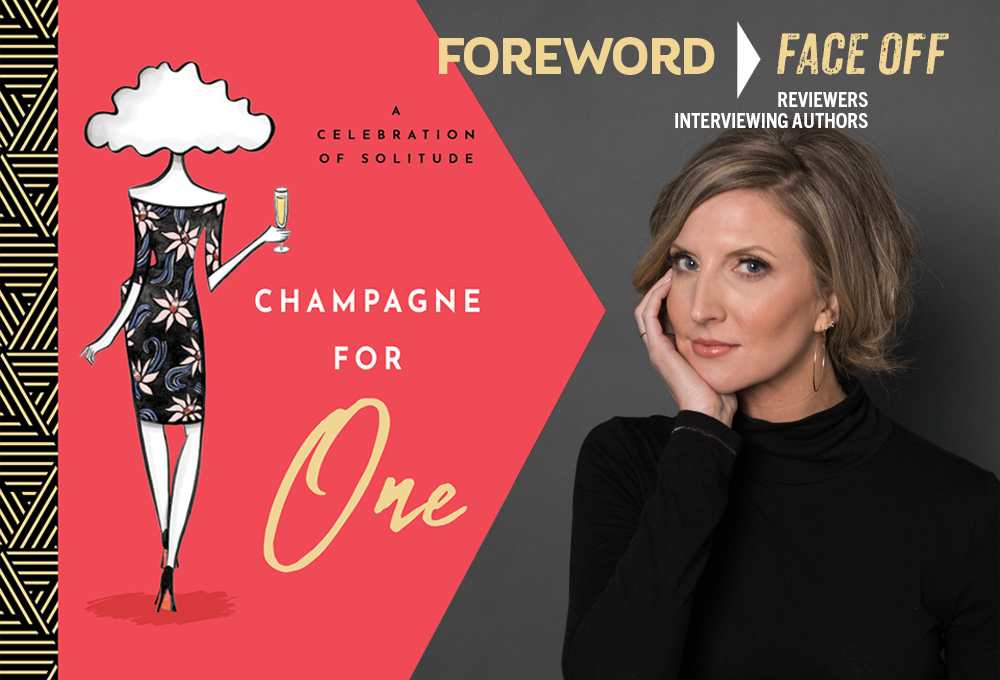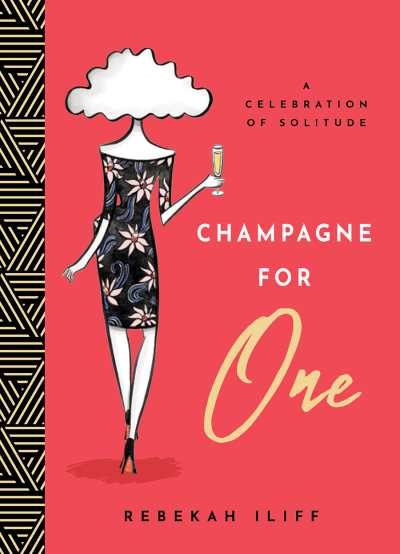It looks like you've stumbled upon a page meant to be read by our code instead of viewed directly. You're probably looking for this page.
Reviewer Rebecca Foster Interviews Rebekah Iliff, Author of Champagne for One: A Celebration of Solitude

You need some alone time. You deserve some alone time. As Gabriel García Márquez, the immortal author of One Hundred Years of Solitude, explains, “The secret of a good old age is simply an honorable pact with solitude.”
And if a nice glass of bubbly is part of the bargain, all the better.

This week, Rebecca Foster connects with Rebekah Iliff to discuss Champagne for One, Rebekah’s recently published Celebration of Solitude. If you’ve secretly enjoyed social distancing, quarantines, and other pandemic side effects, the following interview will offer some answers and further encourage you to embrace your inner loner.
The timing of your book seems perfect. Loving—or at least tolerating—solitude is of perennial importance, but perhaps especially so during a pandemic. What lessons do you hope your readers will draw about the potential benefits of enforced isolation?
Despite the timing of the book’s release, I actually began working on this project in 2018, after the sudden and tragic loss of my best friend. I had just moved to Nashville, in large part because of her, and four months later she was gone. The bottom fell out for me, and yet at the very same time things became clear and liberating: I let go of everything that didn’t “fit,” simply because I had no room or energy for anything other than putting one foot in front of the other. Grief planted itself in my soul, and I went into a period of solitude and reflection for many months. Through that experience I found peace and joy—at a level I have never been able to access before, try as I may.
I believe wholeheartedly that learning how to embrace solitude and “live with one’s self” is the surest path toward being able to function in society. In essence, it’s a core part of being a human. We need solitude as much as we need deep, meaningful relationships with others. While the pandemic was a difficult time for some, it was actually the impetus for many to make shifts in their lives that were likely needed. I hope readers can reframe the idea of being alone and seeking solitude as a positive, life-giving experience, as opposed to something negative. Our culture does a fairly awful job of painting single-dom, solitude, being alone, as anything other than borderline pathetic, or something to be “fixed.” It’s a shallow, untrue narrative I’m attempting to rectify in a fun, lighthearted way.
Did you mostly have single people in mind when writing Champagne for One?
While single folks are certainly a core audience, this is a universal topic (as you mentioned, it is perennial) that can likewise apply to those who have full “relationship plates” and crave alone time. You know, I have mom friends who talk about locking themselves in the bathroom for twenty minutes to hide from their kids—it’s the only way they can get some peace and quiet. So, for the busy mom, she needs permission to prioritize solitude. For the single twenty-something who is seeking “the one,” it’s about learning to accept her alone time as a gift. The book covers the concept of solitude from various vantage points: the young single gal, the divorcee, the busy mama, the career woman. All of it. I wanted to be inclusive of the various stages of solitude, because it’s something we all need across the span of our lifetime.
You talk about the need for alone time even for those in committed relationships. How do you ensure that time in your own life? Do you have some favorite rituals?
One of the main essays in the book is called “Bathroom of One’s Own”—a spin on Virginia Woolf’s quote about needing a “room of one’s own.” In it, I tell the story about how my husband and I have separate bathrooms. We were late bloomers in the marriage category. (Read: I was forty and he was fifty when we finally got hitched.) As you can imagine, the adjustment of suddenly having someone in your most intimate space where you do all the things you don’t want anyone else to know about was jarring. To put a finer point on it: I don’t want my husband watching me “do my business.” There needs to be some mystery; I don’t want to end up like college roommates. I’m certain this is what Emerson had in mind when he talked about “guarding your spare moments.” He was 100 percent talking about bathroom antics.
I also don’t really talk to my husband for the first hour of the day. He makes the best cup of coffee and brings it into my office, where I spend the early part of my morning on my yoga mat, doing daily devotions, meditation, and writing. Around 7 a.m.—once I’ve re-adjusted my attitude problem that somehow comes back in the middle of every night (even after twenty five years of focused prayer, pleading, and crystal healing)—I join him and our pup in the sunroom for morning hugs and more coffee. I’m also a big fan of long walks alone and infrared sauna visits, the latter of which is probably the best-kept secret on planet earth for a one-stop shop for self-care.
Champagne appears here both metaphorically and literally (as in the incident that led to the book’s title). What inspiration did you take from the drink?
For me, champagne is about celebration. As I mentioned, the genesis of Champagne for One is rooted in the loss of my best friend, Katie. She embodied this idea of l’art de vivre (the art of living well): even through her difficult divorce and seemingly insurmountable struggles as a working, single mother, she somehow managed to always find the positive side … the light. She loved to throw a good party, make a big deal of moments that most people would just ignore, and bubbly was her go-to drink. So, I will always hold the best memories of her donning her signature red lipstick, bopping around in a little black dress, and toasting her nearest and dearest with a glass of champagne. She fully embraced life, celebrated the little things, and probably lived eighty years in thirty six because of this approach. It’s a choice; she taught me that lesson. Every time I see a bottle of bubbles, I am reminded of this mindset. Life can be a slog, but it can also be a celebration if we choose to see it that way.
I loved the Parisian-chic look of the book. How did you and your illustrator, Holley Maher, arrive at the recurring motifs?
Holley is such a talented artist, and I am so grateful she agreed to work on the project. I had already written most of the book by the time she came onboard, and I knew I wanted the concept to have a French-meets-1950s throwback feel—from what I’d seen of her previous work, this style fit her aesthetic. We spent some time pulling together images and inspirational looks on Pinterest, where we had a “Champagne for One” board for visual reference. We also wanted to create a cast of recurring, diverse characters throughout the book. It was important for me that anyone could see themselves represented in some small way; we don’t realize how important these visual cues are, and as a writer you don’t always get the opportunity for visuals to accompany your work. The exercise with Holley also became the foundation for the short film I produced in September 2021, which now acts as the book trailer. In a sense, I had a very clear idea of the “Champagne for One” brand—and Holley did a superb job of making it all come to life.
Your website describes your commitment to “truth seeking and the healing power of laughter.” How can humor help us at a time like this?
Someone very smart once said: “A sense of humor is really just a sense of perspective.” We always need humor; it’s a necessary ingredient to not getting so wrapped up in ourselves, in the dramas of life. During particularly dark and difficult times, humor can be a beacon of light that enables us to take one tiny step forward. If we can find humor in something, chances are we have finally arrived at the truth.
Rebecca Foster